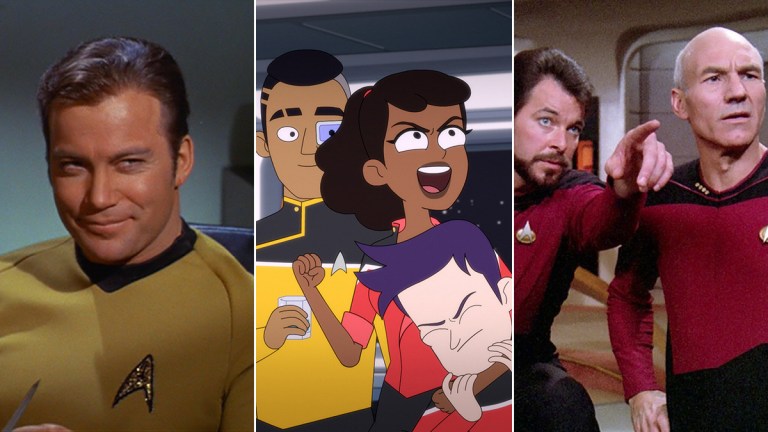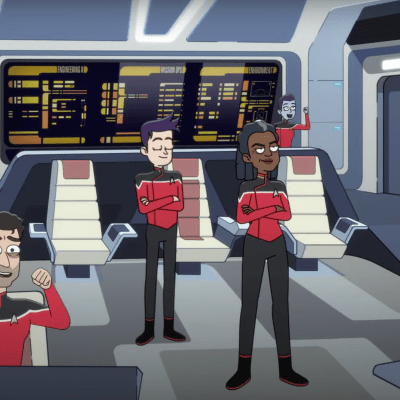Is Star Trek: Lower Decks Canon? Here’s How to Settle the Debate
The question of whether Star Trek: Lower Decks is canon or not is hotly debated. Here’s the easy and smart way to say yes, and still have your canon debates, too.

Spoilers ahead for Star Trek: Lower Decks episodes 1-4.
When it comes to heated fandom discussions about what counts and what doesn’t count, relative to “canon,” the only thing more hotly debated than Star Wars canon, is easily, Star Trek canon. Back in the ‘70s, if you dipped into the letters sections of certain fanzines, you’d find people who argued that the third season of The Original Series wasn’t canon because some of the episodes didn’t make sense or were just outright bad. (We’re looking at you, “Spock’s Brain.”)
The point is, debating specific aspects of Star Trek as non-canon is a pretty old argument. The direct answer to the question “Is Star Trek: Lower Decks canon?” is yes. And that’s because the creator — Mike McMahan — has said its canon, and the show actually bends over backwards to make canonical references.
That said, if you still think Star Trek: Lower Decks can’t be canon, for a variety of reasons, there is one simple way you can reconcile the antics of Mariner and her buddies with the rest of Trek canon. And it’s all about point-of-view, and the unreliability of Star Trek narrators in general.
So, briefly, here are the reasons why some might say Star Trek: Lower Decks isn’t canon.
- The characters are too flippant about new alien lifeforms and break protocol too often.
- Some of the senior staff could be perceived as amoral and/or self-serving egotists.
- The uniform style and new combadges don’t seem to correspond to this moment in Trek history. (2380)
Now, it’s pretty easy to knock down each of those arguments with other canonical examples, from pre- 21st century Trek. For example…
- TOS is replete with examples of junior officers not following protocol and putting the entire ship in danger. Case-in-point: Lt. (junior grade) Joe Tormolen took off his protective gloves in “The Naked Time,” and as a result, caused the entire ship to be contaminated with the Psi 2000 virus. Joe is the original Lower Decker. Just rewatch the scene in the mess hall where he freaks out. You can totally imagine a comedic version of this in Lower Decks.
- TOS also has plenty of examples of Starfleet Captains who not only break the rules, but are total assholes. From Commodore Decker (“The Doomsday Machine”) to Captain Tracey (“The Omega Glory,”) and well into the classic films, it was difficult to find competent senior Starfleet officers on non-Enterprise ships who were as awesome as the Enterprise crew.
Relatively speaking, characters like Captain Tracey, or Captain Esteban (from Star Trek III: The Search for Spock) make Captain Freeman and Commander Ransom look like model officers.
- Debating uniform canon is fun, but ultimately fruitless. Also, there’s wiggle room here for the uniforms to have changed. There’s also every reason to believe that Lower Decks will acknowledge the uniform changes in some future episode. (The show jokes about everything else!)
Okay. So, that wasn’t so hard. Still, maybe you’re still not convinced. Maybe you still think that the overall vibe and tone of the show doesn’t work within canon, and therefore, it just isn’t canon because it doesn’t feel like canon. But, there’s a way around that, too. You just have to think slightly harder about how this story is being told.
Who are the point-of-view characters in most Star Trek shows? That’s right, the characters who run the starship. Star Trek: Discovery changed this a little bit, by having the main character not be the Captain, but in Lower Decks, the tone clearly comes from the point-of-view of the Lower Decker characters. Sure, we have scenes in which none of them appear, but for the most part, we are meant to see this series through their eyes. And that means, it’s okay for them to be unreliable narrators.
In Peter David’s New Frontier novels (which are not canon, and I’m not trying to say they are) he asserts the premise that some people at Starfleet command didn’t actually believe half of the shit Kirk reported in his logs. The idea was that some of the missions of the starship Enterprise (think: Space Lincoln in “The Savage Curtain”) were too outlandish to be true, and that Kirk embellished his logs.
Read more
Now, based on onscreen evidence, we know that Kirk embellished his Captain’s logs; he frequently did it when totally incredible things happened to specific crew members. In Star Trek: The Motion Picture he reports Ilia and Decker as “missing” and in “Where No Man Has Gone Before,” he mentions that Gary Mitchell and Dr. Dehner “died in the line of duty.” If there is an objective viewpoint in Star Trek (which is really debatable) then Kirk’s actual Captain’s Logs are unreliable.
Lower Decks has already sort of gestured at this idea. In the very first episode Boimler is recording a fake Captain’s Log, and in the same episode, Marnier quizzes him about Gary Mitchell, a long-dead officer she probably thinks was “killed in action,” since we’re aware that the official record is false.
Metafictionally, Star Trek does not have a “narrator,” in the same way the Sherlock Holmes stories are (mostly) narrated by Watson. But, that doesn’t mean it doesn’t have a loose “point of view.” In the original Star Trek: The Next Generation episode, “Lower Decks,” our perceptions of the senior staff of the Enterprise were briefly warped when we see everything from the point-of-view of the junior officers. In the series Lower Decks, everything about the show is arguably, from that viewpoint, which includes details that may or may not be “true.”
At the end of Lower Decks’ second episode, “Envoys,” Boimler retells the story of how he and Mariner encountered a Ferengi who Mariner was not aware was a Ferengi. However, by the end of the episode, we know Mariner was pretending not to know in order to make Boimler feel better. If you take that philosophy, and apply it to the rest of the show, it’s pretty easy to make any canon issues evaporate. This story is being told by the Lower Deckers as much it is being told for them. If you have any issues with that, well, then you’re not giving enough credit to the power of narrative voice. The people in a given piece of fiction shape the “truth” of that fiction, just as much as what happens to them.
And, if you still don’t think Lower Decks is canon, I’m just gonna say it again: “Spock’s Brain.” Oh, and Giant Green Space Hand, too.

